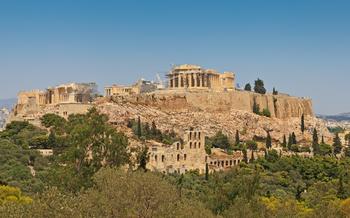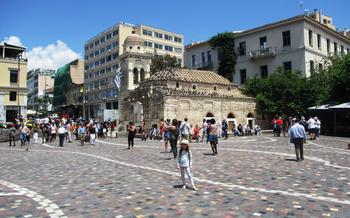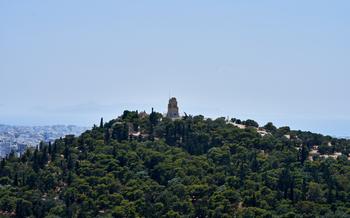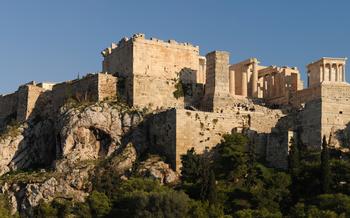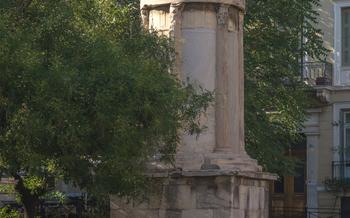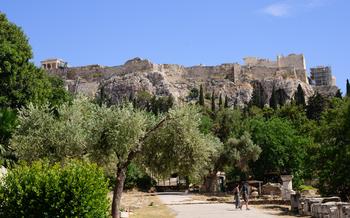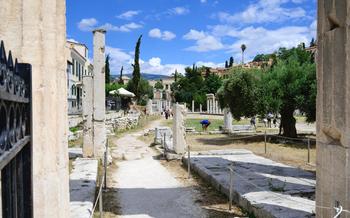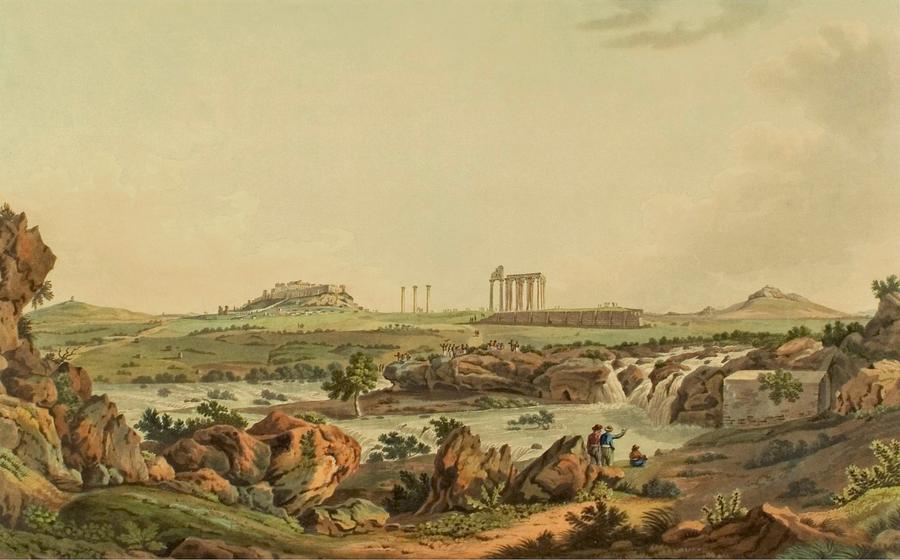
Ilissos River
- A Stroll Along the Riverbanks:
- Historical Significance
- Natural Beauty
- Cultural Landmarks
- Recreational Activities
- Exploring the Academy
- Aristotle's Lyceum
- The Ilissos River Festival: A Celebration of Heritage and Culture
- Visiting the Philopappos Hill
- Exploring the Benaki Museum
- Discovering the Museum of Cycladic Art
- Sustainable Tourism Practices
- Insider Tip
A Stroll Along the Riverbanks:
Indulge in a leisurely stroll along the picturesque banks of the Ilissos River, a tranquil oasis in the heart of Athens. Steeped in history and natural beauty, the river has played a significant role in shaping the city's identity. As you meander along the well-maintained paths, immerse yourself in the serene ambiance created by the gentle sounds of flowing water and the vibrant tapestry of lush vegetation. Take a moment to admire the ancient bridges, monuments, and ruins that adorn the riverbanks, offering glimpses into the city's rich past. Whether you prefer a brisk walk, a leisurely jog, or a relaxing cycling excursion, the Ilissos River offers a rejuvenating escape from the bustling urban environment, providing ample opportunities for recreation and contemplation.
Historical Significance
The Ilissos River holds a significant place in Greek mythology and legends. According to ancient tales, the river was named after Ilissus, a river god and son of Oceanus and Tethys. Ilissus was believed to reside in a cave near the river's source and was often associated with the nymphs who inhabited its waters.
In ancient Athens, the Ilissos River served as a vital water source for the city's population. Its waters were used for drinking, irrigation, and religious ceremonies. The river also played a crucial role in the city's defense, as its deep and fast-flowing waters formed a natural barrier against potential invaders.
The banks of the Ilissos River were also home to several important philosophical schools and academies. Plato's Academy, founded in the 4th century BC, was located near the river's edge, and Aristotle's Lyceum, established a few decades later, was also situated nearby. These schools attracted students from all over the ancient world, who came to Athens to study philosophy, rhetoric, and other subjects.
Archaeological excavations along the riverbanks have yielded a wealth of artifacts and ruins, shedding light on the area's rich history. Ancient bridges, statues, and other structures have been discovered, providing valuable insights into the daily lives and customs of the ancient Athenians.
Natural Beauty
The Ilissos River offers a tranquil escape from the bustling city, with its lush vegetation and serene waters providing a feast for the senses. Plane trees and oleanders line the riverbanks, casting dappled shadows on the water and offering a cool respite from the summer sun. Wildflowers in vibrant hues bloom in abundance, adding a touch of color to the tranquil landscape.
The gentle sounds of the flowing river create a calming ambiance, inviting visitors to pause and appreciate the serenity of the moment. Panoramic views of the Acropolis, Lycabettus Hill, and the surrounding mountains unfold along the riverbanks, providing a breathtaking backdrop to the natural beauty.
Wildlife enthusiasts can spot various bird species, including kingfishers and hoopoes, flitting among the trees or soaring above the river. Turtles and other aquatic creatures can be seen basking in the sun or swimming in the clear waters, adding to the river's vibrant ecosystem.
Cultural Landmarks
The Ilissos River is adorned with a wealth of cultural landmarks that speak to its historical and cultural significance. Among these are ancient bridges, monuments, and ruins that offer a glimpse into the past.
-
Ancient Bridges: Stroll across the Roman-era bridges that once served as vital crossings over the river. The Arch of Hadrian, with its imposing marble archway, stands as a testament to the city's enduring heritage. The Bridge of Aris, though smaller in scale, offers a charming glimpse into ancient engineering.
-
Monuments: Along the riverbanks, you'll encounter statues, memorials, and sculptures that pay homage to notable figures and events. The imposing statue of Themistocles, the Athenian statesman and naval commander, stands tall, overlooking the river's tranquil waters.
-
Ruins: As you wander along the riverbanks, keep an eye out for archaeological remains that hint at the ancient settlements that once thrived here. Unearthed foundations, fragments of pottery, and remnants of walls offer a tangible connection to the past.
-
Museums: The Ilissos River is also home to several museums that delve deeper into the region's history and culture. The Museum of Cycladic Art, dedicated to the study of ancient Cycladic civilization, houses a fascinating collection of artifacts. The Benaki Museum, with its diverse collection of Greek art and artifacts, offers a comprehensive journey through the country's rich history.
Recreational Activities
The Ilissos River offers a range of recreational activities for visitors to enjoy. Well-maintained paths along the riverbanks invite you to embark on leisurely walks or invigorating jogs, immersing yourself in the tranquil surroundings. For a more adventurous experience, designated bike lanes allow you to cycle along the river's edge, taking in the scenic vistas at a faster pace.
Green spaces and benches dot the riverbanks, providing inviting spots for relaxing picnics with family or friends. Spread out a blanket, unpack your picnic basket filled with local delicacies, and savor a delightful meal while basking in the river's calming atmosphere.
Fishing enthusiasts can indulge in their passion in designated areas along the river. Cast your line and enjoy the peaceful pastime of angling, surrounded by nature's tranquility. Whether you're a seasoned angler or simply seeking a relaxing outdoor activity, the Ilissos River offers a serene escape for fishing enthusiasts.
Exploring the Academy
Plato's Academy, nestled beside the tranquil waters of the Ilissos River, holds immense historical significance as the birthplace of Western philosophy. Founded by Plato in the 4th century BC, the Academy served as a renowned center for philosophical inquiry and teachings. Students from across the ancient world flocked to the Academy to learn from Plato and his disciples, engaging in lively debates and discussions that shaped the course of philosophical thought.
Over the centuries, the Academy evolved into a prominent intellectual hub, attracting renowned philosophers, scientists, and scholars. Aristotle, one of Plato's most famous students, later established his own school, the Lyceum, nearby, further contributing to the philosophical legacy of the area.
Today, visitors to the Academy can explore the archaeological remains of this ancient institution, including the foundations of Plato's school and other structures. The serene olive grove that surrounds the site provides a tranquil oasis, inviting visitors to contemplate the profound philosophical ideas that originated here.
To delve deeper into the Academy's history and teachings, visitors can participate in educational programs, workshops, and lectures that delve into the works of Plato and other ancient philosophers. These programs offer a unique opportunity to gain insights into the intellectual pursuits and philosophical discussions that took place along the banks of the Ilissos River centuries ago.
Aristotle's Lyceum
Aristotle's Lyceum, also known as the Peripatos, was one of the most influential philosophical schools in ancient Greece. Founded by Aristotle in the 4th century BC, the Lyceum was located near the banks of the Ilissos River, just outside the walls of Athens. It was a place where Aristotle and his students gathered to discuss and debate philosophical ideas, and where Aristotle conducted his research and wrote his many works.
The Lyceum was more than just a school; it was a community of scholars and intellectuals who were dedicated to the pursuit of knowledge. Aristotle's teachings at the Lyceum covered a wide range of subjects, including physics, metaphysics, ethics, politics, and logic. His emphasis on empirical observation and rational argumentation had a profound influence on the development of Western thought.
The archaeological site of the Lyceum is located in a beautiful park, which offers visitors a chance to explore the remains of this ancient school. The excavations have revealed the foundations of the school's buildings, as well as a number of statues and other artifacts. The park also contains a modern museum, which houses a collection of artifacts from the Lyceum and other archaeological sites in the area.
Visitors to the Lyceum can learn about the history of this important philosophical school and see the place where Aristotle and his students once worked. The Lyceum is a reminder of the importance of education and the pursuit of knowledge, and it continues to inspire scholars and intellectuals to this day.
The Ilissos River Festival: A Celebration of Heritage and Culture
Held annually during the summer months, the Ilissos River Festival is a vibrant celebration of the river's rich heritage and cultural significance. The festival brings the riverbanks alive with a diverse array of cultural performances, art exhibitions, and culinary delights, creating an unforgettable experience for visitors of all ages.
Music, dance, and theater performances take center stage along the riverbanks, showcasing the talents of local and international artists. These performances draw inspiration from the river's history, mythology, and the vibrant culture of Athens.
Art exhibitions line the riverbanks, showcasing the works of local artists and their unique interpretations of the river's beauty and significance. These exhibitions provide a platform for artists to share their creativity and engage with visitors in meaningful conversations about art and culture.
Food and beverage stalls offer a tempting array of culinary delights, featuring both traditional Greek cuisine and international flavors. Visitors can savor delicious dishes and refreshing beverages while enjoying the lively atmosphere and stunning views of the river.
Visiting the Philopappos Hill
Ascend the verdant slopes of Philopappos Hill, a natural sanctuary nestled amidst the urban fabric of Athens. This tranquil haven offers a mesmerizing panorama of the city, with the iconic Acropolis taking center stage. Embark on a leisurely hike through the fragrant pine forest, following well-marked trails that lead to hidden nooks and panoramic viewpoints. Along the way, encounter ancient monuments that whisper tales of Athens' rich past, including the Philopappos Monument, a grand tribute to a Roman benefactor. Discover secluded picnic spots, where you can savor a leisurely repast while immersing yourself in the breathtaking vistas. Philopappos Hill beckons you to escape the city's vibrant energy and embrace the serenity of nature, all while reveling in the captivating history that surrounds you.
Exploring the Benaki Museum
Situated near the Ilissos River, the Benaki Museum is a treasure trove of Greek art and history. With an extensive collection spanning from prehistoric to contemporary times, the museum offers a comprehensive journey through the rich cultural heritage of Greece.
Immerse yourself in the history of ancient Greece through captivating exhibits showcasing pottery, sculptures, and artifacts from various periods. Learn about the Byzantine era and its artistic influences, and admire the intricate mosaics and icons that adorn the museum's halls.
The Benaki Museum also houses a remarkable collection of post-Byzantine and modern Greek art, providing a glimpse into the evolution of Greek artistic expression. Discover the works of renowned Greek artists, such as El Greco, Nikolaos Gysis, and Konstantinos Volanakis, whose paintings capture the essence of Greek landscapes, traditions, and people.
Temporary exhibitions at the Benaki Museum offer a fresh perspective on art and culture, showcasing the works of contemporary artists, exploring specific themes, or highlighting significant historical events. These exhibitions provide a vibrant platform for artistic dialogue and cultural exchange.
To delve deeper into the museum's collections and gain insights into Greek history and art, participate in educational programs, workshops, and guided tours. These programs are designed for visitors of all ages and interests, offering an enriching and interactive learning experience.
Discovering the Museum of Cycladic Art
Nestled in the heart of Athens, the Museum of Cycladic Art stands as a testament to the rich cultural heritage of the Cycladic Islands, a group of islands located in the Aegean Sea. Dedicated to the study and preservation of Cycladic art and culture, this museum houses an impressive collection of ancient artifacts that offer a glimpse into the lives and beliefs of this enigmatic civilization.
At the Museum of Cycladic Art, visitors can marvel at a diverse range of Cycladic figurines, crafted from marble or limestone. These iconic sculptures, dating back to the 3rd millennium BC, are characterized by their distinctive minimalist style, often depicting nude female forms with folded arms and schematic facial features. The museum's collection also includes a variety of pottery, tools, and other objects, providing a comprehensive overview of Cycladic material culture.
In addition to its permanent collection, the Museum of Cycladic Art regularly hosts special exhibitions that explore various aspects of Cycladic art and culture. These exhibitions often feature loaned artifacts from other museums and institutions, allowing visitors to delve deeper into the complexities of this ancient civilization.
To enhance the visitor experience, the museum offers a range of educational activities, including workshops, lectures, and educational programs for children and adults. These programs provide an opportunity to learn more about Cycladic art and culture, its historical context, and its enduring influence on contemporary art and design.
Whether you are an art enthusiast, a history buff, or simply curious about the ancient world, the Museum of Cycladic Art offers a captivating journey into the heart of Cycladic culture. Through its impressive collection, engaging exhibitions, and educational programs, the museum invites visitors to discover the timeless beauty and significance of this remarkable civilization.
Sustainable Tourism Practices
As travelers, it's our responsibility to minimize our environmental impact and support sustainable tourism practices. When exploring the Ilissos River, here's how you can contribute:
-
Embrace Eco-friendly Activities: Opt for walking, cycling, or using public transportation instead of private vehicles. These modes of transport not only reduce carbon emissions but also allow you to experience the river's surroundings at a slower pace.
-
Respect the Environment: Avoid littering and dispose of waste responsibly. Use reusable water bottles to stay hydrated without contributing to plastic pollution. Respect the local wildlife by observing them from a distance and not disturbing their habitats.
-
Support Local Businesses: Choose to dine at local tavernas and restaurants that source their ingredients from local farmers and producers. This supports the local economy and helps preserve traditional culinary practices. You can also shop for souvenirs and handicrafts from local artisans.
-
Minimize Water Usage: Be mindful of your water consumption, especially during dry periods. Take shorter showers, fix leaky faucets, and avoid unnecessary water usage. Remember, water is a precious resource, and conserving it is essential for the river's health and the well-being of the local community.
Insider Tip
-
Hidden gem: Venture off the beaten path to uncover a secluded spot by the river, where you can escape the crowds and immerse yourself in the tranquil ambiance.
-
Best time to visit: For a more intimate experience, plan your visit during the shoulder seasons (spring or autumn) when the weather is pleasant and the tourist crowds are smaller.
-
Photography enthusiasts: Embrace the river's changing beauty throughout the seasons and capture stunning photographs in different lighting conditions.
-
Local events: Keep an eye out for local events and festivals that take place along the river throughout the year. These events offer a vibrant and authentic glimpse into the local culture.



